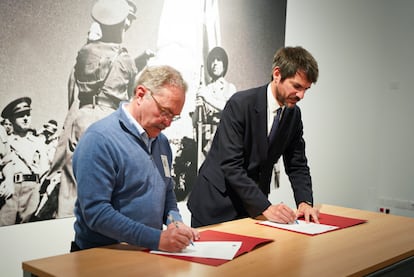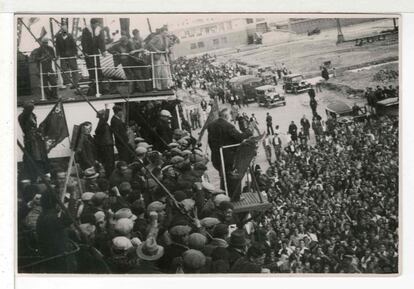Walter was the nom de guerre of Karol Swierczewski, a Pole born in 1897 who, after participating in the Soviet Revolution, became a general in the Red Army. In October 1936 he assumed command of the XIV International Brigade during the Civil War, one of those formed by more than 35,000 volunteers who came from 50 countries to fight against fascism in the Popular Army of the Republic. During the war, photographs were taken of Walter with the soldiers, in Belchite, from the command post… A set of 333 images that are already part of the Historical Archive of Social Movements, created in October 2021, but that until now had remained in hibernation. This Wednesday, the Minister of Culture, Ernest Urtasun, announced at the General Administration Archive (AGA), in Alcalá de Henares, that several collections are incorporated into the reborn archive, among which stands out that of the Association of Friends of the International Brigades (AABI).
Along with the 2,112 images from between 1936 and 1938, the legacy of this association, created in 1995, includes film recordings, documents, such as the files that were made for each brigade member when they arrived or the manuscripts themselves left by these soldiers; objects and books, explained Carlos Domínguez, its spokesperson. In addition to preserving this material, kept in 82 boxes, its cataloging and digitization will begin, “so that it will be available to researchers from September,” Urtasun stressed. Documents will also be incorporated for consultation on the recently launched website of the Historical Archive of Social Movements.
However, when Urtasun was asked about the material resources and personnel available to the archive, which started without them during Miquel Iceta’s time as Minister of Culture, he acknowledged that “they are working on having its own headquarters, but until then will be at the AGA.”
With Iceta, it had also been announced that the archive would house legacies of associations and groups from the final years of Francoism and the Transition, not from the Civil War. Regarding this, Urtasun has declared that “what is intended is to preserve the memory of the fight for democracy of so many associations during the Franco regime, so it is coherent that the International Brigades are there.”
He has also been asked if it would not be more logical for the brigade legacy to be in a specialized space, such as the Documentary Center of Historical Memory, in Salamanca. Urtasun has responded that it was the Association of Friends of the Brigades itself that addressed Culture. In any case, the minister has highlighted the importance of this initiative “against those who promote oblivion and contempt for the victims of the dictatorship.” “The International Brigades symbolize hope in democracy in a Europe then doomed to wars and totalitarianism.”
Transfer from Albacete and Salamanca
For his part, Domínguez has stressed that the documentation of the association he represents has been in the Provincial Archive of Albacete for 25 years, and that with the agreement he hopes that it will now be “easier to consult for any citizen who travels to Alcalá and not to Salamanca or Albacete.” In his speech he recalled that of those young volunteers “about 10,000 died.” “When they enlisted, many did not even know where Spain was,” and he has mentioned some well-known brigade members, such as Esmond Romilly, nephew of Winston Churchill, or John Cornford, great-grandson of Charles Darwin. “The lives of these people should not be forgotten.”
In addition, the legacies of feminist entities, such as the Flora Tristán Provincial Federation of Women’s Associations and the Feminist Research and Training Center, are incorporated into the Archive of Social Movements, managed by the General Subdirectorate of State Archives. “There are more than 400 boxes, with objects, cassettes and other audiovisual and bibliographic materials,” Culture reported. From the union world there is the material from the May 1st Foundation, from the Comisiones Obreras union.

Also noteworthy is the personal file of the jurist Juan José del Águila Torres, “lawyer and founder of the first labor law firm linked to Comisiones Obreras.” A figure who defended workers in the last stage of the dictatorship and from which 350 boxes of documentation arrive that will allow “better knowledge of the methods of repression and the restoration of labor rights.” Another personal archive is that of the socialist senator Fermín Solana (1928-2022), “with more than 200 boxes of information about regions of Spain, press clippings, notes and personal objects.”
Among others, there are also the archives of the Espacio Afro cultural center, in Madrid, “which aims to vindicate people of African descent in Spain”, and those of the Pasaje Begoña Association and the Pedro Zerolo Foundation, both of the LGTBI collective.

